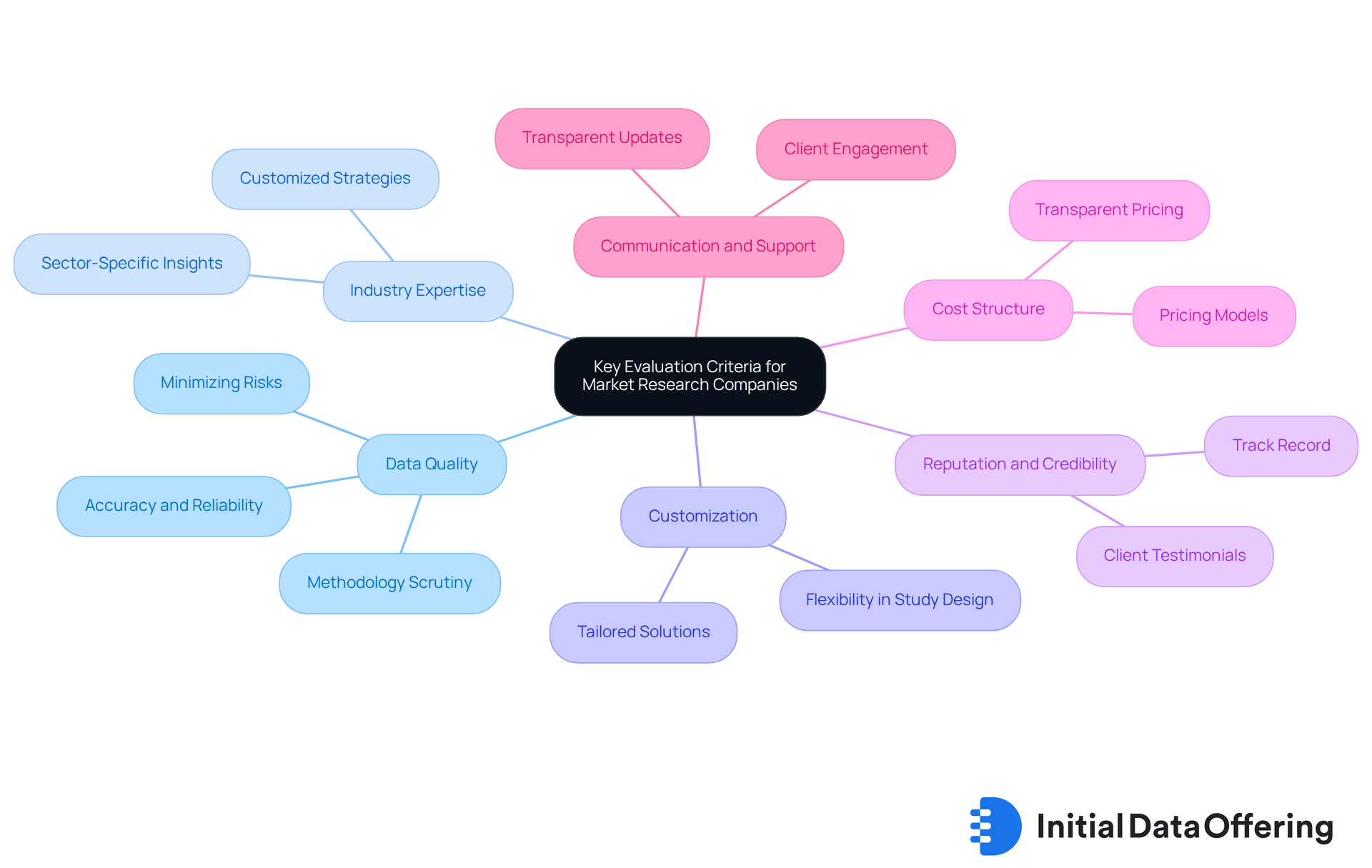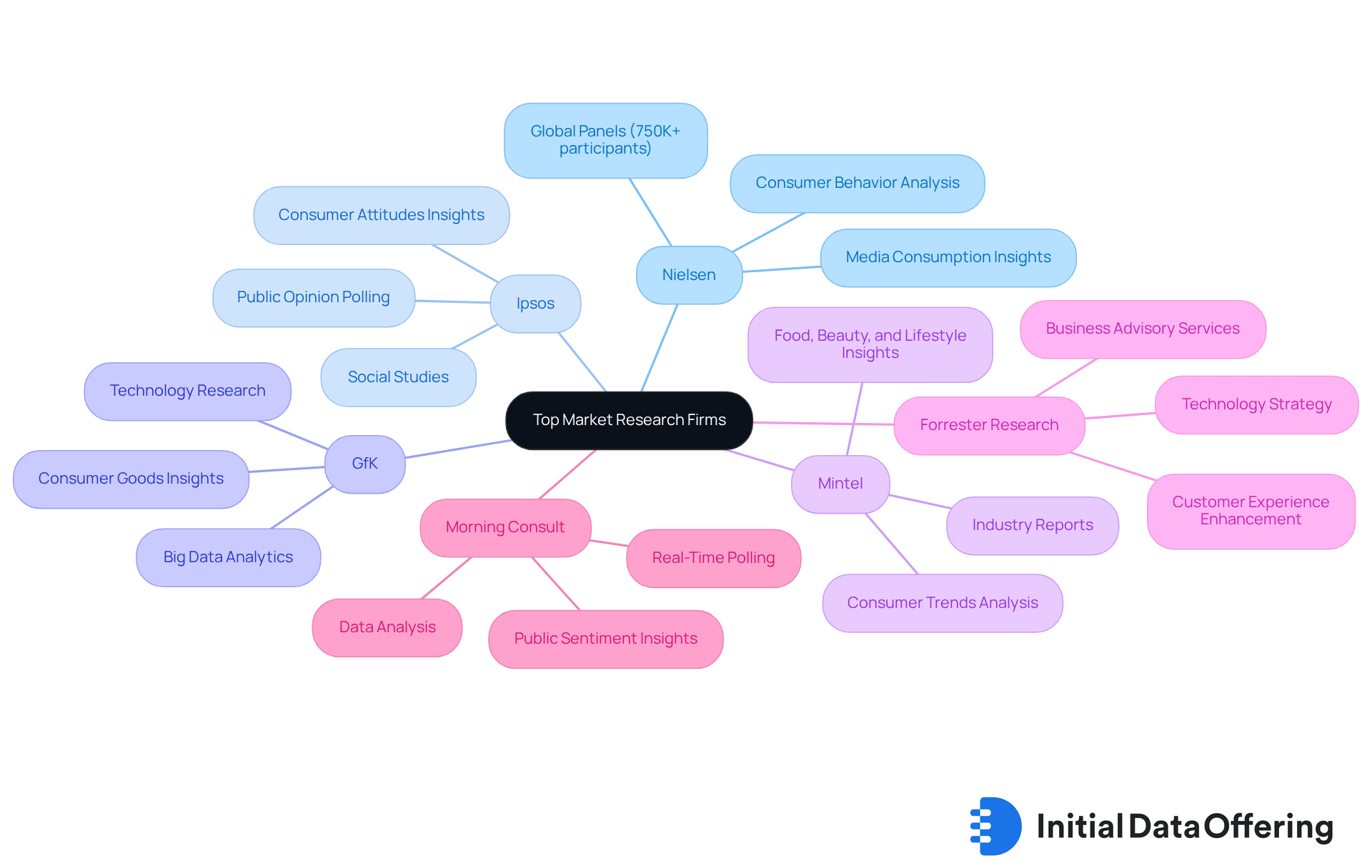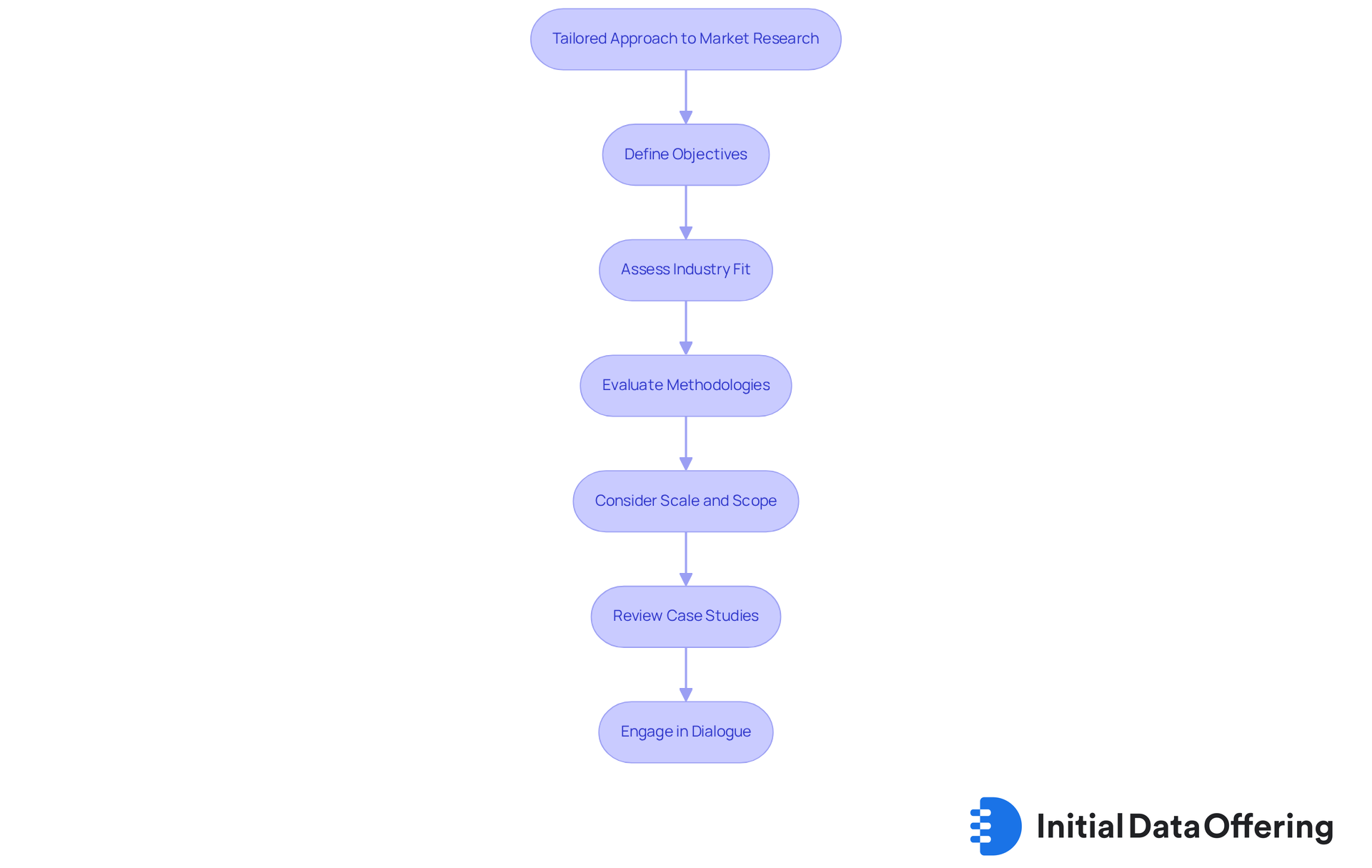Evaluate Market Research Companies: Find the Best Fit for Your Needs

Evaluate Market Research Companies: Find the Best Fit for Your Needs
Overview
To identify the most suitable market research company for your needs, it is crucial to evaluate several key criteria:
- Data quality
- Industry expertise
- Customization capabilities
- Reputation
- Cost structure
- Communication support
Each of these features plays a significant role in the overall effectiveness of the partnership. For instance, high data quality ensures accurate insights, while industry expertise can provide valuable context for your specific challenges. Aligning the strengths of the chosen firm with your research objectives not only enhances the relevance of the findings but also ensures that the selected company can effectively tackle your unique business challenges. Ultimately, this careful evaluation leads to informed decisions that can significantly impact your success.
Introduction
Evaluating market research companies is essential for businesses aiming to make informed decisions in an increasingly data-driven landscape. Understanding key criteria such as data quality, industry expertise, and customization allows organizations to effectively identify firms that align with their specific needs.
However, with numerous options available, how can one determine which market research company truly stands out in delivering actionable insights? This article delves into the critical factors for evaluation, providing a roadmap for businesses to find their best fit in the realm of market research.
Understanding Market Research Companies: Key Evaluation Criteria
When evaluating market research companies, several key criteria should be taken into account to ensure effective decision-making in 2025.
- Data Quality is paramount; the accuracy and reliability of data are essential. Companies must scrutinize the methodologies employed for data collection and analysis, ensuring adherence to industry standards. High-quality data minimizes risks and supports well-founded strategies, making it crucial for informed decision-making.
- Industry Expertise is another vital factor. Different sectors have unique requirements, and firms specializing in specific industries, such as healthcare or finance, often provide deeper insights compared to generalist firms. Their customized strategies can significantly enhance the relevance of the findings.
- Customization plays a critical role as well. The ability to tailor solutions to meet specific client needs encompasses flexibility in study design and the capacity to address distinct business challenges. This ensures that the investigation aligns with the client's objectives and enhances the overall effectiveness of the research.
- Reputation and Credibility are important indicators of a firm's reliability. An organization's track record, client testimonials, and case studies offer valuable insights into its effectiveness. Companies should seek market research companies that have a proven history of delivering high-quality studies that meet client expectations.
- Cost Structure is essential for assessing affordability and value. Understanding the pricing model—whether project-based, retainer, or subscription—helps clients make . Transparent pricing structures facilitate better budgeting and resource allocation.
- Communication and Support throughout the study process are vital. Effective communication ensures that companies provide transparent updates and remain attentive to client questions, fostering a cooperative atmosphere that enhances the investigation experience.
Integrating advanced methodologies, such as AI-driven data validation, emotion recognition technology, mobile-first surveys, and internal analysis platforms, can further improve data accuracy. As industry analysis evolves, staying updated on these trends is crucial for companies to remain competitive and adaptable.

Overview of Top Market Research Firms: Services and Strengths
Here’s an overview of some of the top market research firms in 2025, along with their services and strengths:
- Nielsen: Renowned for its extensive data on consumer behavior and media consumption, Nielsen provides thorough analytics and understanding across various sectors, especially in retail and media. Their comprehensive data and measurement solutions enhance media decision-making, helping businesses navigate the challenges of media fragmentation. Nielsen's credibility is further supported by its global panels, which consist of over 750K participants, ensuring accurate data validation and representation.
- Ipsos: A worldwide leader in surveys, Ipsos specializes in public opinion polling and social studies, offering valuable insights into consumer attitudes and behaviors. Their expertise is crucial for understanding public sentiment and guiding strategic decisions.
- GfK: This firm excels in technology and consumer goods research, offering innovative solutions that leverage big data analytics to drive marketing strategies. GfK's emphasis on technology guarantees that companies remain competitive in a swiftly changing environment.
- Mintel: Renowned for its detailed industry reports, Mintel provides in-depth analysis and insights into consumer trends, particularly in food, beauty, and lifestyle sectors. Their reports assist businesses in predicting industry shifts and adjusting to evolving consumer preferences.
- Forrester Research: Focused on technology and business strategy, Forrester offers research and advisory services that help companies navigate digital transformation and enhance customer experience. Their perspectives are essential for organizations aiming to innovate and enhance their competitive positioning.
- Morning Consult: This organization focuses on real-time polling and data analysis, offering perspectives that assist businesses in grasping public sentiment and trends in the industry. Their agile approach allows companies to respond quickly to emerging issues and consumer needs.
These market research companies together signify the leading edge of , each providing distinct advantages that address various business requirements. Significantly, case analyses like 'The Gauge' and the '2025 Annual Marketing Report' provide additional understanding of audience behaviors and worldwide marketing trends, strengthening the credibility of these firms in the analysis landscape.

Matching Market Research Firms to User Needs: A Tailored Approach
To effectively match market research firms to user needs, consider the following tailored approach:
- Define Objectives: Clearly outline your research goals. Are you looking for customer information, market trends, or competitive analysis? Establishing precise objectives is crucial for guiding the selection process.
- Assess Industry Fit: Choose companies with proven proficiency in your specific industry. For example, healthcare organizations should prioritize companies skilled in medical studies, ensuring relevant insights and methodologies. Notably, 83% of B2B2C enterprises utilize market research companies for market analysis, underscoring the significance of selecting the appropriate company.
- Evaluate Methodologies: Different companies employ various research methodologies. Confirm that the company's approach aligns with your objectives, whether you require qualitative, quantitative, or mixed methods. This alignment is essential for obtaining actionable insights. Warren Buffett emphasized, "Without data, you're just another person with an opinion," highlighting the necessity of aligning research objectives with organizational capabilities.
- Consider Scale and Scope: Determine if your project necessitates a large-scale study or a more focused analysis. Certain companies focus on extensive data gathering, while others thrive in specialized markets, making it essential to align their strengths with your requirements.
- Review Case Studies: Examine companies that have successfully completed projects similar to yours. For example, the "Fashion Retail Segmentation" case study illustrates how targeted strategies can enhance engagement and drive sales. Case studies provide valuable insights into their capabilities and the outcomes they have achieved, helping you gauge their effectiveness.
- Engage in Dialogue: Initiate discussions with potential firms to assess their understanding of your needs and their proposed solutions. This interaction can reveal their commitment to customization and client service, ensuring a to your research objectives.

Conclusion
Evaluating market research companies is a critical step for businesses aiming to make informed decisions and drive strategic growth. By focusing on key criteria such as:
- Data quality
- Industry expertise
- Customization
- Reputation
- Cost structure
- Communication
organizations can identify the best fit for their unique needs. This comprehensive approach ensures that companies not only select a provider that meets their immediate requirements but also one that aligns with their long-term objectives.
Throughout the article, essential insights were shared on the importance of each evaluation criterion. High-quality data and industry expertise are foundational for effective research outcomes. Customization and a firm’s reputation play pivotal roles in ensuring relevant and actionable insights. Additionally, understanding the cost structure and fostering effective communication throughout the research process are vital for a successful partnership. Highlighting leading market research firms such as Nielsen, Ipsos, and Mintel underscores the diverse capabilities available to businesses seeking tailored solutions.
Ultimately, the selection of a market research firm should be a deliberate and strategic decision. By defining objectives, assessing industry fit, evaluating methodologies, and engaging in meaningful dialogue with potential partners, organizations can enhance their research efforts and drive impactful results. Embracing a tailored approach to market research not only strengthens decision-making but also positions businesses to thrive in an ever-evolving landscape.
Frequently Asked Questions
What are the key criteria for evaluating market research companies in 2025?
The key criteria include data quality, industry expertise, customization, reputation and credibility, cost structure, and communication and support.
Why is data quality important in market research?
Data quality is crucial because the accuracy and reliability of data minimize risks and support well-founded strategies, enabling informed decision-making.
How does industry expertise affect market research?
Industry expertise is vital as firms specializing in specific sectors can provide deeper insights and customized strategies that enhance the relevance of their findings compared to generalist firms.
What role does customization play in market research?
Customization allows market research companies to tailor solutions to meet specific client needs, ensuring the study design aligns with the client's objectives and enhances the research's effectiveness.
Why are reputation and credibility important when choosing a market research company?
Reputation and credibility are important indicators of reliability, as a firm's track record, client testimonials, and case studies provide insights into its effectiveness and ability to deliver high-quality studies.
How should clients assess the cost structure of market research companies?
Clients should understand the pricing model—whether project-based, retainer, or subscription—to make informed decisions, and transparent pricing structures help with budgeting and resource allocation.
What is the significance of communication and support during the research process?
Effective communication ensures transparent updates and responsiveness to client questions, fostering a cooperative atmosphere that enhances the overall investigation experience.
What advanced methodologies can improve data accuracy in market research?
Advanced methodologies include AI-driven data validation, emotion recognition technology, mobile-first surveys, and internal analysis platforms, which can enhance data accuracy and adapt to evolving industry analysis trends.